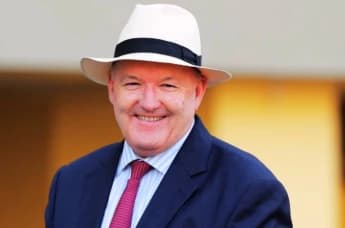"From Unblemished Record to Disqualification: The High-Stakes Drama of Ed Dunlop"

No wrongdoing suggested on part of trainer, but rules lead to one-year suspended disqualification.
Ed Dunlop Calls for Rule Review After Suspended 12-Month Disqualification Over Positive Cocaine Test in Racehorse
A Shocking Setback for a Respected Trainer
In a twist that has sent shockwaves through the British horseracing community, esteemed trainer Ed Dunlop has found himself at the center of a controversy after the British Horseracing Authority (BHA) handed him a 12-month disqualification—completely suspended—following the discovery of a cocaine metabolite in one of his horses, Lucidity. The incident stems from a race in 2023 at Brighton, where Lucidity finished second, only for the post-race tests to reveal the presence of the banned substance.
For a man who has dedicated over 30 years to the sport without a single blemish on his record, this ruling has come as a bitter pill to swallow. Despite the BHA not accusing Dunlop of any intentional wrongdoing, the strict nature of the rules surrounding Category A substances like cocaine left little room for leniency.
The Case Unfolds
The hearing, which dragged on for over a year, left many in the racing world questioning the fairness of the process. The substance found in Lucidity's system remains a mystery, and the source of contamination has not been identified. Nevertheless, the rules dictate that any positive test result for a substance in this category must lead to disqualification, regardless of intent or awareness.
Dunlop's legal representative, Rory Mac Neice, argued passionately for a reduced penalty, highlighting the trainer's unblemished record and the uncertainty surrounding the contamination. However, the independent disciplinary panel remained firm, insisting that the rules necessitate a disqualification.
The resulting one-year suspension is, however, fully suspended, meaning that Dunlop can continue training unless another breach occurs within the next 12 months. Additionally, Lucidity was disqualified from her Brighton race, and Dunlop was slapped with a £1,000 fine—a sum that pales in comparison to the reputational damage inflicted by the ruling.
Dunlop Speaks Out: A Plea for Fairness
In the aftermath of the decision, Dunlop expressed both frustration and resolve. "It's been hanging over our heads for over a year," he said, reflecting on the lengthy process that has cast a shadow over his career. "As it was a Category A drug, there is very little room for manoeuvre, so it has been agreed that it will be a one-year suspended disqualification, plus the fine."
The trainer, known for his integrity and commitment to the sport, was quick to acknowledge his ultimate responsibility for what happens to his horses. However, he was equally vocal about the need for a review of the rules that offer no flexibility in such situations. "Personally, I do feel the rule needs looking at. I had no room for manoeuvre because of the class of the drug, and it's been difficult, but we will carry on and put it behind us," he asserted.
A Change in Approach
The impact of this ordeal is likely to be long-lasting, not just for Dunlop but for the broader industry. In a proactive move, Dunlop revealed plans to implement random drug testing among his staff, a measure that is becoming increasingly common in racing and other industries. "It will certainly make us think more," he admitted. "We are going to introduce random drug testing amongst my staff, which more trainers are doing and other industries do too. It will change how we operate our business."
This case underscores the fine line trainers must walk in a sport where they are held strictly accountable for their horses' welfare. While the presence of a banned substance is undeniably serious, the circumstances surrounding this case suggest a need for greater nuance in the application of rules. As Dunlop moves forward, the broader industry would do well to consider whether current regulations strike the right balance between fairness and accountability. The introduction of random drug testing within stables could be a step toward safeguarding trainers while maintaining the integrity of the sport.






